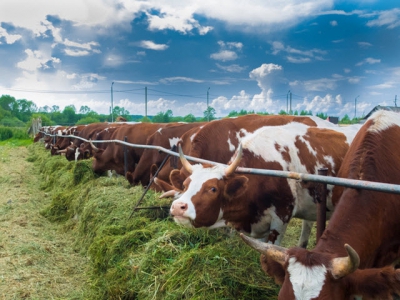Nutrition 2.0 could bring dietary changes for dairy cows

Almost all classes of nutrients can act like hormones, and some feed additives may need to be reconsidered in terms of their role in signaling, says researcher.
We spoke to Barry Bradford, professor at Kansas State University, to hear more about his work on “Nutrition 2.0” at the Cornell Nutrition Conference for Feed Manufacturers.
The concept of Nutrition 2.0 is about where nutritional science meets livestock diet formulation - nutrients are being reclassified as new knowledge is gained, he explained.
The increase in understanding of the role of nutrients was primarily driven by advances in basic science and the sequencing of the human genome, he said. When that project was completed, multiple previously unknown genes were found to be nutrient receptors or hormones produced by non-endocrine organs.
“We may have a nutrient that [previously we thought only acted] as a fuel, but now we find out it has hormone-like effects as well, so it may change, the number of things you might think about using it for – it’s not just [about] calories.
“Almost all classes of nutrients can act like hormones. Essentially, they signal in the same way that hormones do.
“There’s more than one mechanism, but one of the primary mechanisms is this hormone-like signaling effect that we didn’t realize occurred."
Tackling stress
Some feed additives may need to be reconsidered in terms of their role in signaling, he said. “This more complex, nuanced understanding is more likely to benefit us in those places where we haven’t been able to or haven’t taken the time to do a lot of careful research.”
One area that has already been getting some additional attention is nutritional approaches to stress conditions, he said. For a period, there was little data on nutrition specific to cows in transition or facing heat stress or illness.
Understanding how nutrients can work in these situations could lead to improved responses:
“There are a lot of nutrients now where we’ve identified direct signaling effects on immune cells, which might lead us to say, ‘What if we supplement nutrient x during mastitis, would that help this cow resolve the infection quicker and get back to normal?’”
“We need to do challenge studies, we need to actually make animals sick or subject them to heat stress and try different strategies in those scenarios and see if, maybe we couldn’t find the effect of something in a normal [situation], but the stressors make them more responsive to this nutrient,” he said.
Epigenetics
Epigenetics can be used to change the chemical signatures of DNA by making them more or less available, but without altering the gene sequences, he said. Nutrition can be used to influence expression.
Although evidence is scanty, logic suggests that young calves could be programmed by specific nutritional elements and potentially see long-term benefit, he suggested.
“The other one … is how we feed dry cows and the potential epigenetic carryover on their offspring.”
“We know very little about how feeding calves or dry cows or transition cows might change their epigenetic signature and have effects over years or months.”
Related news
 Study: Cows fed functional oils have greater milk fat yield in comparison with those fed mo
Study: Cows fed functional oils have greater milk fat yield in comparison with those fed mo Blended functional oils boost milk fat production, support dairy cow production during heat stress and could provide producers an alternative to ionophore use
 Alternative antimicrobial chitosan may boost dairy cow feed efficiency
Alternative antimicrobial chitosan may boost dairy cow feed efficiency Supplementing dairy cow diets with chitosan may boost feed efficiency and increase milk levels of unsaturated fatty acids, however, also adding whole raw soybea
 Beef checkoff transparency lawsuit proceeds
Beef checkoff transparency lawsuit proceeds USDA and NCBA file opening briefs for summary judgment on whether they should release government audit documents.